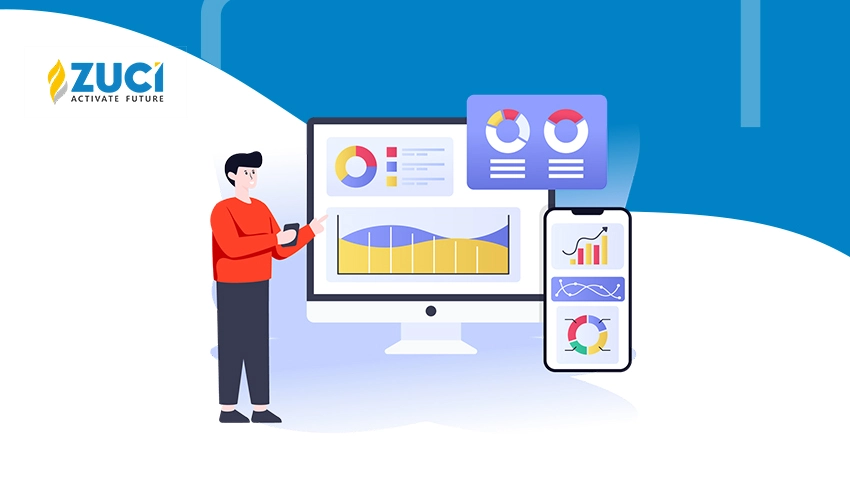Reading Time : 1 Mins
Top 7 Data Analytics Challenges Faced by Organizations
A web-analytics nerd, speaker - here delving into (Big)-data.
In the digital era, every organization produces a multitude of data in various formats. One of the challenges organizations experiences is capturing actionable insights from the raw data available from internal and external sources. That’s precisely where data analytics comes into play.
When it comes to industries such as banking, healthcare, entertainment, retail, and education, each sector produces a wide range of data in its internal database, and without a skilled data analytics team, organizations find it difficult to cope with the ongoing challenges of accessing and deriving insights from the data.
Guess what?
Deloitte surveyed over 25 CDOs, sharing their top three priorities for 2023 and beyond; over 65% said they want to improve and organize how they use data and analytics in their organization. These figures indicate that organizations are keen on equipping their data analytics capabilities. Whether you are a Chief Data Officer or a decision-maker in your organization, this blog will help you address data analytics challenges and improve the data culture in your organization.
Here you go!
Data Analytics Challenge 1: High Volume of Data
With data volumes rising year after year, especially in industries such as banking and healthcare, it is challenging for enterprises seeking to streamline and equip their data analytics capabilities. Owing to multiple data formats across offline, customer calls, digital channels (website, apps), and other intricate data sources, enterprises are inundated with vast quantities of information on a daily basis. Extracting business insights from this ocean of data requires robust infrastructure, advanced analytics tools, and fast-paced data processing capabilities.
How does Zuci help organizations encounter data analytics challenges of colossal data?
- We assess organizations’ data landscape to understand the data sources’ volume, variety, and velocity.
- Based on the assessment, we deploy a scalable cloud data storage solution tailored to business needs.
- We optimize the cloud infrastructure to ensure it scales seamlessly as data volumes grow.
Data Analytics Challenge 2: Data Integration
As mentioned above, integrating data from complex sources is a tedious task. Organizations face data analytics challenges in building custom ETL pipelines to extract data from each source, transform it into the required format, and load it into a central repository for data analytics activities.
Besides, legacy systems and siloed data repositories hinder achieving a unified view of the data landscape to perform advanced analytics. Enterprises must implement a concrete, cohesive data integration strategy to break down these barriers and create a unified data ecosystem to drive informed decision-making.
How does Zuci help organizations seamlessly integrate data from disparate sources?
- We catalog diverse data sources, including databases, apps, and other third-party systems.
- Based on the discovery phase, we create a data integration strategy that projects the data inflows and ETL processes required to view organizations’ data comprehensively.
- We establish data observability practices to identify issues, ensuring ongoing data reliability promptly.
Data Analytics Challenge 3: Data Warehousing Architecture
Establishing a concrete data warehousing architecture is vital for enterprises to store structured data from multiple sources, organize it, and write SQL queries to access the data to perform analytics activities. However, architecting and maintaining data warehouses that can accommodate organizations’ unique needs is a large feat. For instance, scalability, data governance, and performance optimization require intense planning and resources.
How does Zuci manage data analytics challenges of building a data warehousing architecture?
- Following the requirements gathering phase, we design a custom data warehouse that aligns with organizations’ data analytics goals and needs.
- We implement on-prem/cloud data warehousing architecture to extract, load, and transform data from various sources into the data warehouse.
- We optimize the data warehouse’s performance, fine-tune queries, and build data models to improve query performance for seamless analytics.
Data Analytics Challenge 4: Unstructured Data
While data warehouses solve the data analytics challenges of storing and operating structured data, organizations struggle to activate unstructured data such as images, PDFs, text documents, and audio/video files. All the unstructured data is stored in non-relational databases, i.e., data lakes (to get closer to performing data analytics activities and derive actionable insights). Hence, choosing the proper data lake with the appropriate cloud provider is critical to overcoming the data analytics challenges on unstructured data.
How does Zuci equip organizations to perform advanced analytics with unstructured data?
- We explore and understand organizations’ diverse unstructured data sources to promptly identify the right insights to drive business growth.
- We select the appropriate AI models for advanced analytics, such as image recognition and document text extraction.
- We integrate the trained models into the organization’s analytics workflow to derive insights from unstructured data to improve business operations.
Data Analytics Challenge 5: Data Quality Assurance
Organizations need to ensure that their sourced data from disparate sources are rich in accuracy to perform analytics. Enterprises often face data quality issues stemming from inconsistencies, redundancies, and errors within their datasets. Implementing robust data quality assurance processes, including data profiling, data cleansing, data labeling, data quality monitoring, root cause analysis, and establishing data quality assessment, will help enterprises overcome the data analytics challenges of poor data quality.
How does Zuci help organizations encounter data analytics challenges of poor data quality?
- We employ data profiling tools to assess data quality and identify outliers, missing values, and inconsistencies.
- With respect to the data profiling results, we implement data cleansing processes to address issues such as data validation, deduplication, and standardization.
Data Analytics Challenge 6: BI Modernization
While data analytics promises to unlock valuable insights, effectively communicating those insights to stakeholders remains a significant challenge. Enterprises often need help creating intuitive, visually appealing reports and dashboards that convey complex data in a digestible format. Here’s where business intelligence modernization comes into play.
How does Zuci resolve data analytics challenges of self-service analytics?
- Based on the unique requirements, we choose the right BI tools, such as Tableau, QlikSense, Power BI and the likes.
- Our BI experts design custom dashboards tailored to the organization’s needs, with intuitive visuals and interactive features to allow stakeholders to explore insights seamlessly.
- We provide post-deployment support, empowering the internal team to use the BI tools for self-service analytics to extract reports for decision-making.
Data Analytics Challenge 7: Scalability and Performance
As data volumes spike, enterprises must ensure that their data analytics infrastructure can accommodate the increasing demands for storing, processing, and analyzing vast volumes of datasets. Failing this, organizations will fall behind in storing their data in a data warehouse or lake, leading to the inability to extract business-critical reports. Scaling analytics solutions to handle growing data volumes whilst maintaining optimal performance and responsiveness is a complex process that requires careful planning and investment in scalable cloud technologies and architectures.
Zuci’s approach to scale infrastructure to growing demands:
- We perform a 360-degree assessment of your existing analytics infrastructure to identify latency issues, bottlenecks, and areas for optimization.
- We develop strategies to ensure your analytics infrastructure can handle growing data volumes and increasing demand for leveraging cloud-based technologies.
If you are facing any of these challenges in your organization, reach out to our experts. We will help set up your data infrastructure to perform advanced analytics seamlessly. Leave your details here; Our team will get back to you.
Related Posts






















